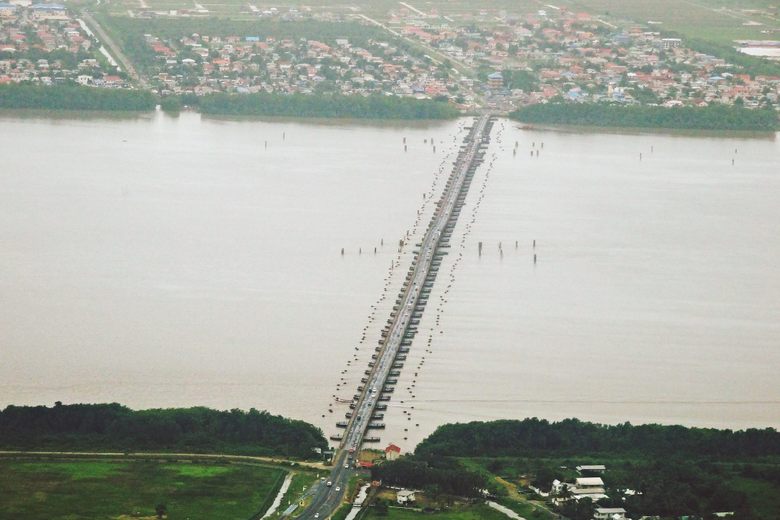The controversial Chinese company “China Railway Construction Corporation Limited” (CRCC), sanctioned by the World Bank in 2019 for fraud and corruption, will build a new bridge over the Demerara River in Guyana.
The government of Guyana and the Chinese company signed the contract for US$260 million at the end of May. Although the bridge’s design has not yet been fully completed, preparatory work will begin immediately.
“China is a country that doesn’t tend to respect climate and environmental issues,” said Daniel Pou, a security expert and the director of the Dominican Republic’s Citizen Security Data Analysis Center. “It’s always been that way everywhere the company has invested,” he adds.

Construction is estimated to take two years. The four-lane floating structure with bike lanes will be more than 2.65 kilometers long and 24 meters wide, with a useful life of 100 years.
According to the Guyana Ministry of Public Works, the new structure will replace the existing 44-year-old bridge.
POTENTIAL IMPACT
However, work on the new bridge will begin without an environmental and social impact assessment (EIA). Guyanese environmentalist Simone Mangal-Joly warned that “the lack of basic information about the bridge design makes it impossible to conclude the impacts associated with the bridge.”
An environmental impact assessment is required for any activity that changes the physical and human environment. The construction of a bridge alters the environment in the area where it is built.
According to a final paper for the civil engineering program at the Catholic University of Santiago Guayaquil in Ecuador, there may be damage to flora, fauna, water, soil, and air pollution.
“Chinese investments in the region are deepening the asymmetries of costs […] and environmental distribution inequities, […] and in Latin America, we are left with the environmental burdens,” charged Ariel Slipak, coordinator of the Argentine Foundation for the Environment and Natural Resources (Fundación Ambiente y Recursos Naturales).
“We are the ones who pay for the environmental costs, such as the depletion of water resources. Mangal-Joly stressed that the Demerara River has high sedimentation, so the piers placed in the river for the bridge’s construction will greatly affect the flow of water, which she called “the most critical area.”
POOR PRACTICES
In 2019, the World Bank expelled CRCC, China’s state-owned infrastructure development company, its subsidiaries, and its 730 controlled affiliates for bad practices in awarding contracts for the East-West Highway Corridor Improvement Project in Georgia for submitting manipulated information.
Bad practices or not, China wants to build a road connecting Guyana’s Georgetown and Berbice coasts with northern Brazil and a major port to bring its ships to the Pacific Ocean, Pou said. “It is undoubtedly a dominant project,” he added.
CHINESE EXPANSION
Projects by Chinese-owned and operated companies have expanded in Guyana. One of these projects is the “China National Offshore Oil Corporation” participation in the consortium that controls the Stabroek oil fields.
Other examples include the acquisition of the Omai bauxite mine by the Chinese company “Bosai Minerals” and the expansion of the already-delayed Cheddi Jagan International Airport by the “China Harbour and Engineering Corporation.”
Talks on another project, the Amaila Falls hydropower plant, resumed in mid-July after negotiations with “China Railway First Group Limited,” the preferred bidder that the World Bank also sanctioned in 2019 in connection with fraudulent practices in a hydropower project in Pakistan, reached an impasse in May.
China’s presence in the Americas has grown stronger since 2010, as it has become involved in extracting raw materials, critical minerals and energy resources, and the construction of mega-infrastructure.
RETHINKING THE RELATIONSHIP
Diana Castro, a professor at the Andean University Simón Bolívar in Ecuador, suggests that Latin American countries should rethink their financial relations with China.
“Latin American countries face two options in terms of their relations with China: They can follow the path of extraction or reevaluate key economic and financial models to reduce their environmental footprint and contribute to climate change.
“Countries need to strengthen civil society organizations to challenge those who finance [projects] and ensure that they comply with the Escazú Agreement’s standards on access to information, public participation, and justice in environmental matters in Latin America and the Caribbean,” Slipak concluded.
The Escazú Agreement, signed in 2012 by 25 Latin American and Caribbean countries, is the first international treaty in Latin America and the Caribbean on environmental issues and the first to include provisions on the rights of environmental activists.
With information from Latina Press

